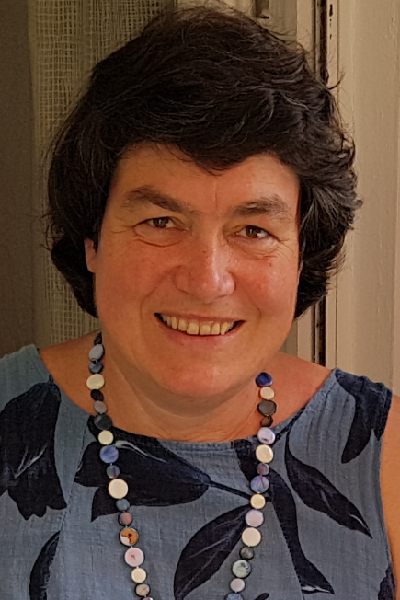Ute Bohnacker
Professor in General Linguistics at Institutionen för lingvistik och filologi
- Telephone:
- +46 18 471 70 08
- E-mail:
- ute.bohnacker@lingfil.uu.se
- Visiting address:
- Engelska parken
Thunbergsvägen 3H - Postal address:
- Box 635
751 26 UPPSALA
Download contact information for Ute Bohnacker at Institutionen för lingvistik och filologi
More information is available to staff who log in.
Short presentation
Ute Bohnacker is Professor of Linguistics at the Department of Linguistics & Philology and also a Reader in Scandinavian Languages. Her research expertise is mainly in first and second language acquisition, bilingualism, narrative, grammar and discourse, with a special interest in the Germanic languages. Her recent work has expanded towards language assessment and impaired populations and examines typical and atypical multilingual child language development in a Swedish context.
Research
Ute Bohnacker is a Professor of Linguistics (since 2010) and a Reader in Scandinavian Languages (2006). Having grown up in Germany as a dialect speaker of Swabian, she studied languages and linguistics at Tübingen, London and Durham (UK), with a PhD thesis (1999) on the syntax and morphology of bilingual child Icelandic/English. Her research expertise is mainly in first and second language acquisition, bilingualism, narrative, grammar and discourse, with a special interest in the Germanic languages. She also has a long-standing experience in supervising graduate students and teaching general linguistics, Swedish linguistics and German.
Ute Bohnacker's work has expanded towards language assessment and impaired populations and examines typical and atypical multilingual child language development. She is currently directing a research project, BiLI-TAS, on bilingual preschool and primary-school children growing up with Turkish, Arabic, German and Swedish (Swedish Research Council 2014-2019, Bank of Sweden Tercentenary Foundation 2020-). Bohnacker and her team are investigating vocabulary comprehension and production, phonological processing and narrative abilities in relation to age, language exposure and individual and environmental background factors. By building a knowledge base for age-related linguistic skills of bilingual children in Sweden, better, evidence-based, decisions can be made about what constitutes typical development and what should be considered a warning sign or clinical marker of language impairment (developmental language disorder) in multilingual children. The results are relevant for theoretical bilingualism as well as speech-language therapy and education.
Publications
Recent publications
- Learning and unlearning Verb second word order (2024)
- Sweden's multilingual language policy through the lens of Turkish-heritage family language practices and beliefs (2023)
- Turkish heritage families in Sweden (2022)
- Turkish Mother Tongue Instruction in Sweden (2022)
- Children's acquisition of referentiality in narratives (2022)
All publications
Articles
- Sweden's multilingual language policy through the lens of Turkish-heritage family language practices and beliefs (2023)
- Turkish heritage families in Sweden (2022)
- Turkish Mother Tongue Instruction in Sweden (2022)
- Storytelling in bilingual Turkish-Swedish children (2022)
- Storytelling in bilingual children (2022)
- How do age, language, narrative task, and language proficiency and exposure affect narrative macrostructure in German-Swedish bilingual children aged 4 to 6? (2022)
- Character introductions in oral narratives of German-Swedish bilingual preschoolers (2022)
- It is not the ideology but the resources (2022)
- Non-Word Repetition and Vocabulary in Arabic-Swedish-Speaking 4–7-Year-Olds with and without Developmental Language Disorder (2022)
- On transfer and third language acquisition (2021)
- Ordförrådsutveckling hos arabisk-svensktalande och turkisk-svensktalande barn i förskoleåldern och vid skolstart (2021)
- Arabic-Swedish-Speaking Children Living in Sweden (2021)
- A new perspective on referentiality in elicited narratives (2021)
- Introduction to MAIN–Revised, how to use the instrument and adapt it to further languages (2020)
- Adapting MAIN to Arabic (2020)
- Vocabulary Development in closely-related languages (2020)
- MAIN: Revised Swedish version (2019)
- Background on MAIN–Revised, how to use it and adapt it to other languages (2019)
- MAIN: Multilingual Assessment Instrument for Narratives - Revised (2019)
- MAIN: Revised German version (2019)
- Macrostructural organization of adults' oral narrative texts (2019)
- Tell me a story in English or Swedish (2016)
- Turkish- and German-speaking bilingual 4-to-6-year-olds living in Sweden (2016)
- Fundament, formellt subjekt och frekvens (2014)
- Null subjects in Swabian (2013)
- Acquiring Persian Object Marking (2013)
- Information-structural constraints on word order in advanced L2 Swedish (2012)
- MAIN: Swedish version (Svenska) (2012)
- The clause-initial position in L2 Swedish declaratives (2010)
- Introduction (2010)
- Fundamentet i svenskan och tyskan - Syntax och informationsstruktur (2009)
- The clause-initial position in L2 German declaratives (2008)
- The clause-initial position in L2 German declaratives (2008)
- On the “vulnerability” of syntactic domains in Swedish and German (2007)
- On the “vulnerability” of syntactic domains in Swedish and German (2007)
- How to start a declarative V2 clause (2007)
- Placing verbs and particles in non-native German and Swedish (2006)
- When Swedes begin to learn German (2006)
- Book review: (In)vulnerable domains in multilingualism (2005)
Books
- Children's acquisition of referentiality in narratives (2022)
- It is not the ideology but the resources (2022)
- Developing Narrative Comprehension (2020)
- Nordic Journal of Linguistics Special issue on the Nordic languages and second language acquisition theory (2010)
Chapters
- Learning and unlearning Verb second word order (2024)
- MAIN story comprehension (2021)
- Bilingual development of Turkish-speaking children in Sweden (2020)
- Cross-linguistic development of narrative comprehension from A to Z (2020)
- Subordination in children acquiring Turkish as a heritage language in Sweden (2020)
- Bilingual Turkish-Swedish children's understanding of MAIN picture sequences (2020)
- Inferential comprehension, age and language (2020)
- Assessment of narrative abilities in bilingual children (2015)
- Reflections on dummy 'do' in child language and syntactic theory (2013)
- Interaction of syntax and discourse pragmatics in closely related languages (2010)
- Article acquisition in English, German, Norwegian and Swedish (2009)
- Article acquisition in English, German, Norwegian and Swedish (2009)
- The role of input frequency in article acquisition in early child Swedish (2007)
- Nonnative acquisition of Verb Second: On the empirical underpinnings of universal L2 claims (2005)
Conferences

